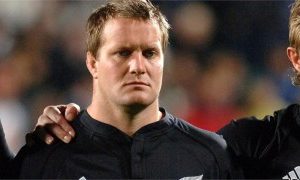
“There’s always been this pressure about ‘who is the gay All Black?'” the former prop says.
“You know – ‘there’s one out there, but who is it?'”
“And whenever something like that would appear in the media, friends and former team-mates would send me the link with a laughing emoji, and we’d all have a bit of a chuckle.”
Why the laughter?
Because Johnstone, 43, was that gay All Black and in January he made headlines around the world by speaking publicly about his sexuality for the first time.
It was a watershed moment for the game and a deeply personal one for the New Zealander.
Born into a sports-mad family, Johnstone was introduced to rugby by his two older brothers – who didn’t exactly hold back when it came to the physicality of the game.
“It makes you a little more battle-hardened,” he laughs.
“You might be a couple of steps ahead of the other kids because you’ve had – in a bizarre way – the pleasure of being beaten up by your older siblings!”
It certainly stood him in good stead, as Johnstone moved up through the ranks.
He went to university to make sure he had something to fall back on if rugby didn’t work out, but playing professionally was always the goal.
In 2005 he reached the pinnacle of his sport when he was selected to represent New Zealand.
“The adrenaline rush is incredible,” Johnstone says of his call-up.
“Your coaches know the effort you’ve put in to get there, and then there’s the sacrifices my parents made for me to pursue my dream – taking me to games, driving round, dealing with me when I was the grumpy kid around the house who’d had a bad game… So it was sheer excitement!”
‘I was scared it could derail the dream I had’
Johnstone was All Black number 1056 and played in three Tests in 2005.
He made 72 appearances for Canterbury and 38 for the Crusaders before retiring in 2012.
On the outside, there was little to separate the prop from any of the men who’d come before him.
But on the inside, Johnstone knew different.
He’d realised he might be gay as a teenager and feared it could be the end of his rugby dreams.
“I was a boy who wanted to be an All Black, that was my goal,” Johnstone says.
“That ideal world was about masculinity – a Kiwi bloke that was strong, had a wife and kids, things like that. So when those feelings were popping into my head, I was quick to push them aside.
“I was scared, that’s the best way to put it. I was scared it could derail the dream I had.
“It was like I was stuck between a rock and a hard place.
“The game gave me so much enjoyment, yet on the flip side, when I’d come home – because I wasn’t being honest – that gave me a lot of anxiety.
“And then I’d go back to rugby and I’d never actually think about it, because I was fully focused on playing the game.”
Johnstone loved rugby too much to ever consider quitting. But he knew the stress of keeping his sexuality a secret simply wasn’t good for him.
“Stopping was never going to happen,” he says.
“It was more like, I’m gay and I’m going to have to come out.
Johnstone decided not to come out publicly during his playing career but told his friends and family
“I told a few team-mates and they asked if it was going to change the way I play?
“I said ‘no’, then they asked if I still wanted win?
“I said ‘yeah’, so they said: ‘Well, let’s get on with it!”
“It was like I’d told them we’d run out of milk or something, that sort of scenario. I’d built up this illusion of fear – whereas in reality, once I’d started telling people, it was no problem.
‘It’s something I’m so grateful and forever indebted for’
His team-mates’ reaction went beyond mere acceptance.
“They knew I was a deeply private person who didn’t really enjoy photos or media or anything like that,” Johnstone remembers.
“They always knew that if someone had said something or outed me in public, it would have hurt me deeply – so no-one once even spoke about it.
“I know friends were getting calls [about gay players] from reporters and they’d just be like: ‘Well, there might be, but I don’t know. Anyway, see ya later!’
“I don’t think people realise how respectful the rugby family is and it’s something I’m so grateful and forever indebted to them for.”
The discretion and support of Johnstone’s team-mates allowed him to tell his story at his own pace, in his own way, at the end of January.
Three weeks on and his phone is still pinging with messages of support and people reaching out to share their own stories.
“We thought it may go New Zealand-wide,” Johnstone says with a laugh.
“But when the news landed, it just exploded – it’s quite incredible!”
“I was naive because I just thought ‘it’s little old me, I can’t really help people’.
“But then I sat back and had a good think about it, and spoke to a lot more people. I was a lot more comfortable with who I was and decided that if I could open up that door and take away all that stigma – all that talk and gossip or whatever you want to call it – it’s going to make it so much easier for other players.
“There won’t be that pressure and that media hype, because it’s all gone now.
“And the reality is that the messages I’ve got and the stories people have been sharing… it’s just been incredible and humbling.
“So hopefully, this has helped to clear the path.”
Source – BBC Sports



Share your thoughts